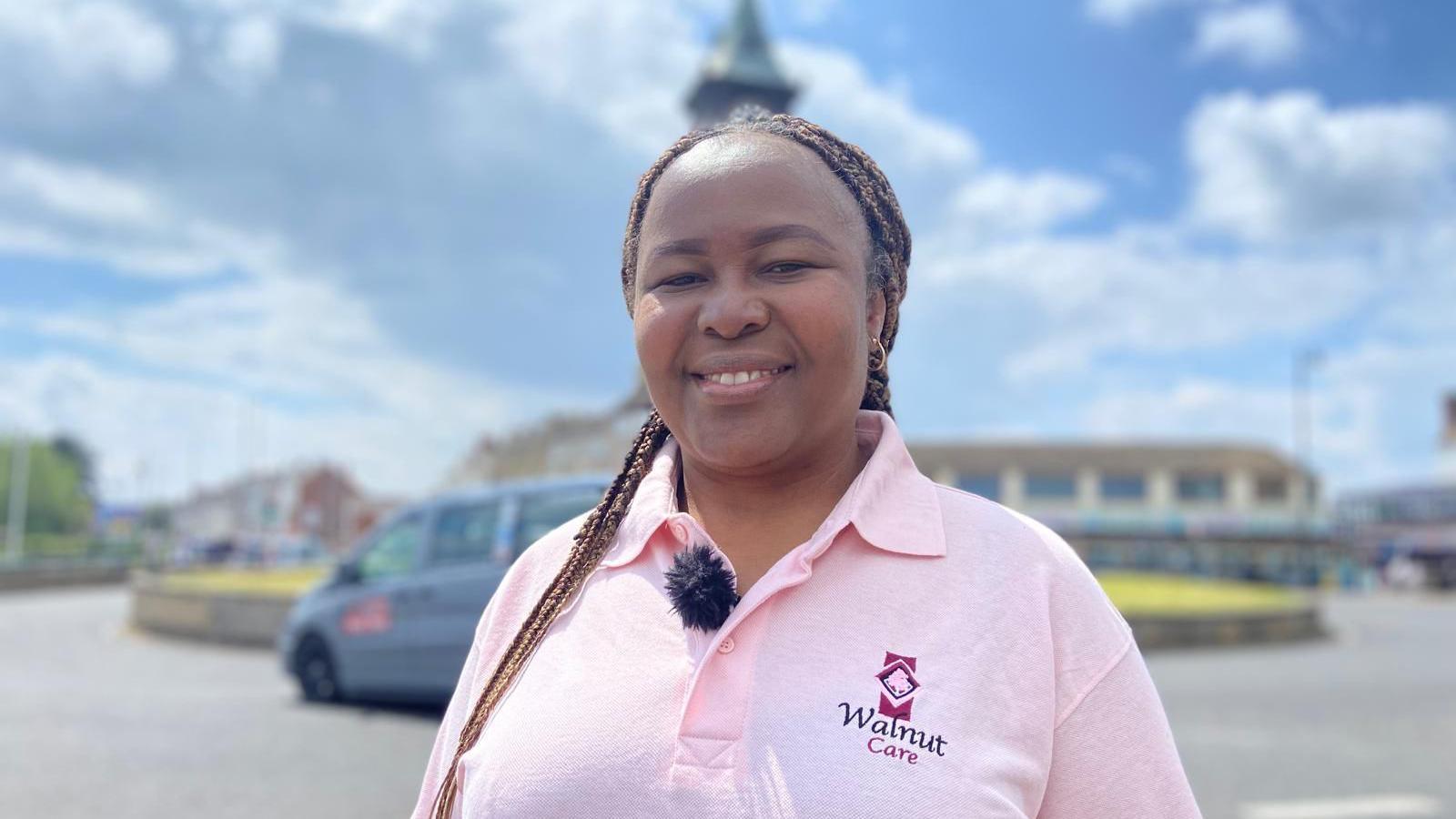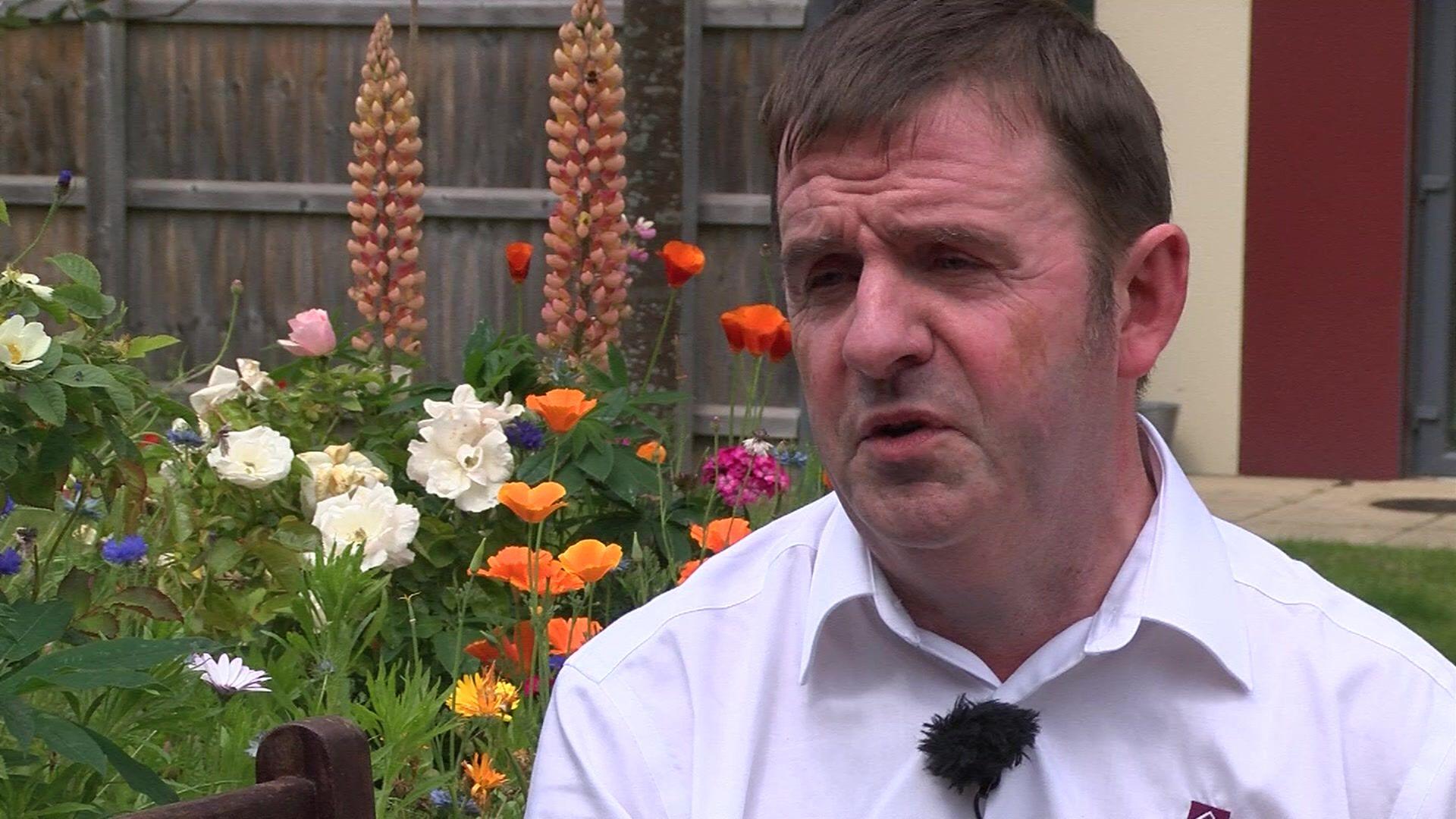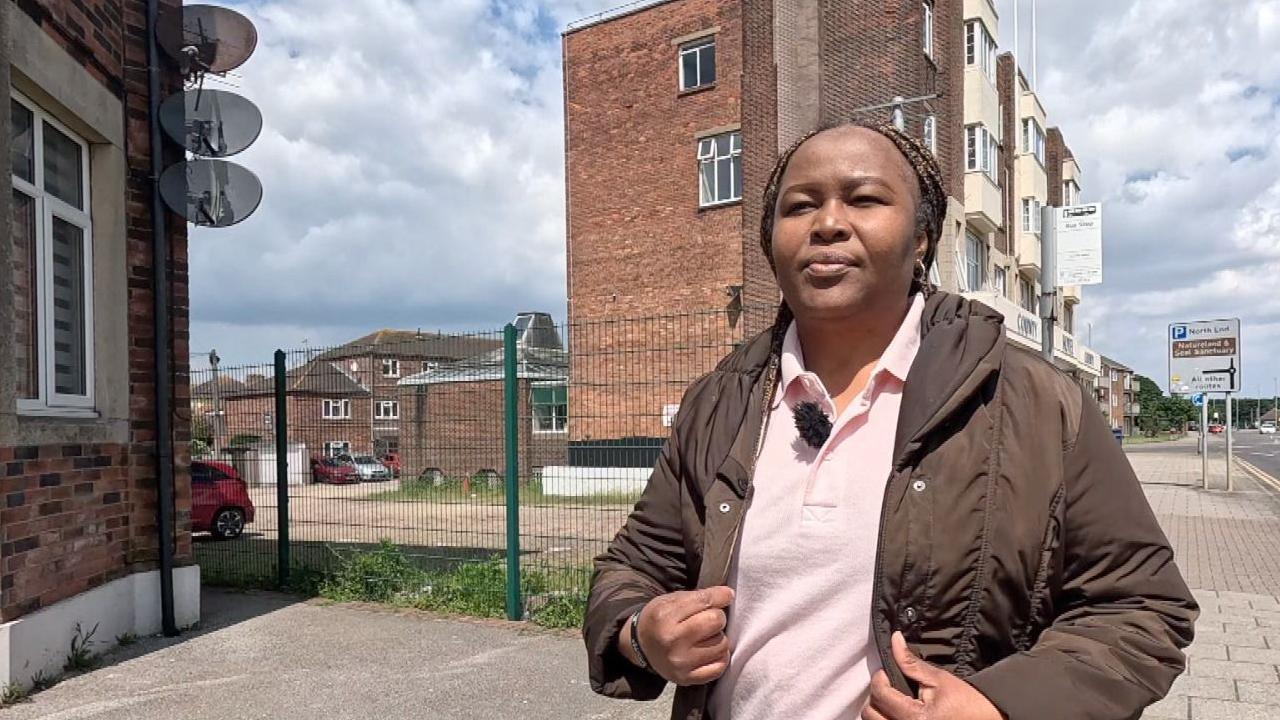'We're not different to them' - migrant worker

Kiki Ekweigh is a care worker in Skegness
- Published
Every summer the population of Skegness swells to 250,000 people. An influx of holidaymakers come for endless sandy beaches, cheap and cheerful shops and bars, and the bright lights and sounds of the arcades. It's often nicknamed Skegvegas. But it's not this kind of migration many in the town are worried about.
As the summer sun dwindles, the population returns to about 20,000.
Kiki Ekweigh is one of those who stays, working as a carer for the town's vulnerable. Every day she walks between home visits on her round.
She came here legally from Nigeria, initially as a student, but now on a work visa.
Students and health and care workers like Kiki represent around two thirds of visas granted in the UK last year, and according to the Migration Observatory at Oxford University are the biggest drivers behind increases in net migration since the 2010s.
But in Skegness, there has been concern about the pressures caused by a smaller portion of migrants - the 8% who are asylum seekers.
I walk with Kiki, passing the seafront attractions. An arcade, a log flume, a fish and chip shop with a speaker blasting out pirate music.
"It's a vast difference for me, but I like Skegness," she says.
"When you have time you just come out and walk around. The environment is good for me; it's playful, it's good for my mental health and wellbeing."
But Kiki is aware that not everyone in the town is a fan of migrants. "I watch the news so I'm not totally ignorant of what is happening," she says when asked about the conversation around immigration.
"If people have negative impressions it's been misconstrued in my opinion. I don't think they are really aware of the reality what is happening on the ground. A lot of people are vulnerable here and they need care. I think they are misguided in their perceptions," she says.

Gary and Dee Allen refused an offer of £563,000 to house asylum seekers at their hotel for a year
'Dumping ground'
No small boats carrying people land on the beaches in Skegness, but a number of hotels on the seafront were used until very recently to house asylum seekers while their claims were being processed.
Hundreds of local residents attended a public meeting about the topic, amid concerns the area had become a "dumping ground".
The vast majority of those seeking asylum have since been moved out of the hotels, but locally concerns about the impact of migration remain.
Julieanne Bunce, who runs the North Parade Hotel, says "it caused a lot of issues for a lot of people".
"They didn't cause us any bother at all," she says, but adds: "The sense generally within the Skegness area was that people didn't want them here."
But Gary Dee, owner of the Hatters Hotel, says he lost hundreds of bookings because of the presence of asylum seekers in the town.
"Tensions run high in Skegness regards the immigrants. They completely destroyed the town centre. Immediately as they started to arrive we lost hundreds and hundreds of bookings, along with everybody else in the town," he says.
Gary sees immigration as having put pressure on local services like the NHS. "We're only a small island, we can't afford to keep funding these things. The NHS is breaking. You can't see your doctors," he says.
For Gary, the strain it has put on Skegness is too much, particularly the presence of asylum seekers over the past couple of years.
"To have four or five hundred illegal immigrants - and that's the key word, they are illegal - wandering up and down in flip-flops and on their phones when they're supposed to have no money. It puts people off.
"And it has put people off for three years," he continues.
"We've just not recovered, and with that in mind we put our place on the market."

In February 2023 protesters marched through Skegness in opposition to hotels being used to house asylum seekers
Dr Ben Brindle, a researcher for the Migration Observatory at The University of Oxford, says some of the concerns are legitimate.
"Wages do fall, albeit very slightly for the lowest earners [because of migration]," he says.
He also says there is "likely to be a bit more pressure on the rental market because migrants are less likely to own their own home".
But one of the concerns in the constituency of Skegness and Boston has been the speed of immigration, rapidly changing the ethnic makeup of the area.
In 2011, 11% of the population were born outside of the UK, by 2021 that figure had risen to 17%. In 2001, it was below 3%.
Dr Brindle says "migrants as a whole pay in about as much as they take out through the use of public services" but says government spending has not caught up.
"If you have quite a fast increase in the population in a particular area it will be some time before government allocation of funding starts to reflect that change in population," he says.
Policy has meant that despite migration benefiting the public purse, governments have been pocketing the difference.
"Rather than taking the increased revenue they had due to migration and using that to fund public services to meet the demand from those migrants, what they have done is chosen to reduce borrowing instead. That meant, per person, less money was being spent on public services," he says.

David Weatherley says attracting new people to work in the care sector has been more difficult since the pandemic
Bumblebees buzz in a flower-filled garden at an assisted living complex in Skegness. David Weatherley - Kiki's boss - explains the challenges of recruiting in social care.
"It's not always valued and attracting new people in since the pandemic has been much harder, and wages are not always brilliant," he says.
"Why don't you pay more locally?" I ask. "Surely that would allow local people to have the job rather than having to import migrant workers."
He tells me: "The vast majority of care is paid for by the government. It's based on the minimum wage, and it's not a minimum wage job - it's a highly skilled job. Ultimately, society, we, taxpayers, voters need to make a decision about whether we value social care."

Kiki walks between jobs as a care worker in Skegness
Kiki knocks at the door of the third door on her route, "Hello! It's cheeky Kiki!" she says, laughing, as she heads inside.
"Being a carer is not an easy job. You have to be mentally balanced, you have to have empathy, you have to be very patient," she says.
But she gets a lot of job satisfaction too.
"Some of the houses I come out like I'm floating out of the houses because I've given them care and they have shown that they appreciate what I'm doing," she says.
"People are more receptive now because they see a lot of us [migrants] around now and we're not different to them really."
BBC Politics North is on BBC One on Sunday at 10:00am and on BBC iPlayer.
Follow BBC Lincolnshire on Facebook, Twitter, external, and Instagram. Send your story ideas to eastyorkslincs.news@bbc.co.uk, external